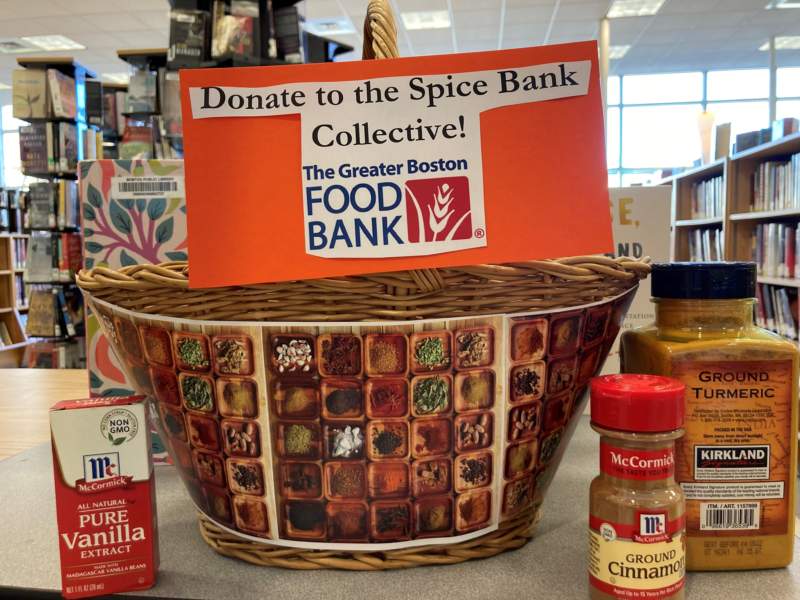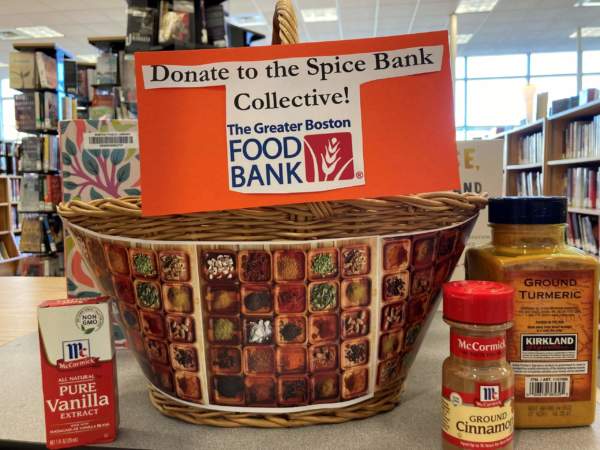By Ginger DeShaney
 They say variety is the spice of life, but you’d be hard-pressed to find any spices in a food pantry.
They say variety is the spice of life, but you’d be hard-pressed to find any spices in a food pantry.
Stephanie Chace, nutritional literacy coordinator for Boston Public Library and organizer of its Spice Bank Collective, is on a mission to change that.
“It’s an idea I’ve carried with me for a very long time, probably 8 or 10 years,” she said. “Whenever I would see a call-out for a food pantry for people to donate, you would see the list of things that most pantries were looking for; nonperishables was ultimately the final message. Bring canned goods, bring boxed mac and cheese, and I was always kind of struck that spices, which are nonperishables, were never listed.
“So that always stuck with me. Now with food pantries really expanding what they can offer — including fresh vegetables — it seemed like the spice component was still missing.”
Stephanie doesn’t think the public is really aware of the lack of spices at food pantries. “With the fresh fruits and vegetables that are offered now, I thought, well, this is probably a good time to shepherd this in.”
So this month, Stephanie started the Spice Bank at 21 branches of the Boston Public Library, including the South Boston branch. The Greater Boston Food Bank delivered boxes to each branch.
There is also a drop-off point at the Newsfeed Cafe at the Central (Boylston Street) location. The cafe will match any donation it takes in, Stephanie said.
“That’s a really great added value. They are committing to this. We are grateful for that.”
Spices can be very expensive, Stephanie said.
“I think that with that expense, people are hesitant to try new foods and new recipes. There might be a recipe calling for a particular spice, like fenugreek, and if you’re on a budget, or even if you’re not, you don’t know if you really want to go there.
“The way I see spices and the role they play in people’s lives and in food, it’s a way to maintain a cultural identity, so mental health there, and then family traditions, emotional well-being,” Stephanie added. “Having spices encourages creative and nutritional cooking.”
Packaged goods are typically high in sodium, she said. “When you’re working with spices and dried herbs, you’re controlling your flavor, you’re connecting with your traditions, so I think that is the element of spices at play.”
The Spice Bank will run through 2022.
People can drop off unopened, unexpired, sealed containers of spices and dried herbs at their nearest branch. “It’s however people are moved,” Stephanie said. “Whatever they want to give.”
You can drop off spices and herbs at the South Boston branch from 10 a.m. to 6 p.m. Monday through Wednesday, noon to 8 p.m. Thursday, and 9 a.m. to 5 p.m. Friday. Stephanie suggests going to the circulation desk to drop off the spices since the boxes may not be on the floor.
“Don’t put the spices in the book drop!”
Each branch will choose which pantry they want to donate to for the year. If a branch doesn’t have one in mind, the Greater Boston Food Bank will help them locate one.
Stephanie did a Spice Bank pilot program in 2019 at the Faneuil branch and it received 135 containers that went to the ABCD Food Pantry in the Brighton area.
“I’m excited that it’s happening,” Stephanie said. “I think where people have been wanting to give to food banks and maybe lately haven’t been, this is a new opportunity to do something different.
“They are welcome to come and do something different and donate spices to our Spice Bank Collective.”







